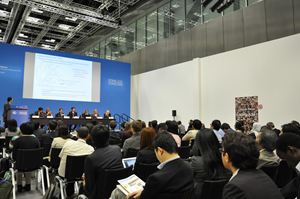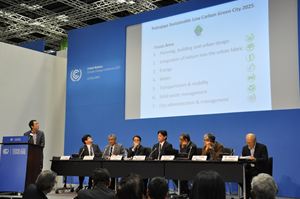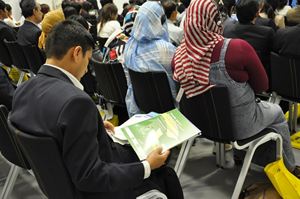
Today, the 5th day of COP18/CMP8 (November 30, Friday) saw the staging of a side event, jointly hosted by the National Institute for Environmental Studies (NIES) and Universiti Teknologi Malaysia (UTM) with the title “Low Carbon Actions in Asia: Modeling to Bridge Science and Policy”.
Presentations were first made at the side event on the latest research outcomes from the scenarios “Ten Actions towards Low Carbon Asia” and “Iskandar Malaysia Low Carbon Society Blueprint”. Concrete policy measures towards the realization of low carbon society in Asia were debated and proposed with the former scenario representing research targeted at the entirety of Asia and the latter focusing on a particular region of Malaysia. In both cases COP18/CMP8 was the first occasion on which these research outcomes were presented to the world. A press conference on the blueprint was also held on the morning of the same day.

Subsequently, 7 panelists active in various fields were invited to debate on the basis of the research outcomes presented on such issues as how exactly progress should be made towards the creation of Asian LCS, what further support was necessitated for such, and so on. During this debate, the expectation was also expressed that Japan should continue to contribute to the Asian region by means of ongoing research. There were also pointed questions at the venue about the current and forthcoming issues being tackled by NIES and UTM researchers – such as how the funding for the realization of policy measures should be acquired, and how the progress of research would be monitored.

With more than 100 attendees at the side event, we can pronounce it an unqualified success. In advance of the side event we were somewhat worried that the limit of the scope of the side event to “Asia” would not attract participants from outside the region. However, there were in fact many participants from Africa. Certainly, while the scope of research may be limited to Asia, in its capacity as an individual case study, it seems inevitable that these outcomes will have a degree of applicability to other countries and regions. This we imagine is the reason that there were many participants from regions not in the scope of the research.
After the completion of the side event, researchers responded individually to the requests of the Malaysian and Japanese press. Thus, we hope that our intended message will by these means and other channels be effectively conveyed to persons who were not present at the side event venue.
More detailed information on the side event can be found at the below website (Low Carbon Society Scenarios towards 2050)
Mikiko KAINUMA, Fellow, Center for Social and Environmental Systems Research, NIES, also presented at the side event of the International Research Network for Low Carbon Societies, LCS-RNet, “Achieving Low Carbon Societies - Common Challenges” (November 27, Friday). More details can be found at the below link (LCS-RNet website).
